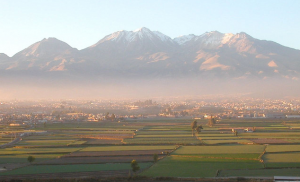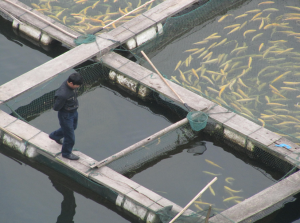If you are trying earnestly to maintain your weight, you may have the phrase “watch what you eat” in mind. Junk food and sweets are out, but the question you forgot to ask is: should you be wary of other foods on your plate as well? The answer is yes.
Studies have revealed that Persistent Organic Pollutants (POPs) play an indirect role in adding fat mass to the body. People are affected by the environment because all our needs ultimately come from the surroundings and these very pollutants are able to enter your diet to alter the endocrine system, organ function, tissues, as well as fat cells.
Where Persistent Organic Pollutants (POPs) Come From
Predominantly used as pesticides, Persistent Organic Pollutants (POPs) are now under restricted usage. These chemicals were created for industrial processes and were also released as by-products.

Smog filled with pollutants created from factories easily reach neighbouring crop fields.
Source: Gustavo Madico, Flickr
Once exposed to the environment, POPs travel far and wide, made possible by its resistance to most chemical and biological processes in normal degradation. Naturally, animals consume available POPs, leading to its bioaccumulation in tissues. The problem is then amplified with biomagnification in food webs, and humans are, of course, at the top of the food chain.
This video by Sustainable Consumption and Production Regional Activity Centre summarizes the impact of POPs:
Since POPs accumulate in fatty tissues of animals, we consume them when our meal includes fatty fish, meat, and dairy products.
An increasing number of studies are finding a strong link between POPs and body weight. POPs have been shown to affect key endocrine pathways in the human fatty tissue and there is a strong correlation between the expression of obesity marker genes (determinants of obesity) and POP concentrations. In another study, a group of mice tested with a high-fat diet containing high POP levels gained more visceral body fat then the group of mice with a low-fat diet. This indicated that metabolic processes were altered, leading to obesity and insulin resistance, which can progress to Type 2 Diabetes. In fact, diabetes poses a possibly even more harmful health problem than obesity itself!
Possible Solutions
Despite the fact that POPs are highly regulated to limit its toxic effects, they can still be found in many environments because of the movement within food chains. Does this mean you should lose all faith in the foods you eat? Hopefully not! As further research gives more evidence to support the causal role of POPs, awareness will increase and perhaps POPs will no longer be put in use.
It may be helpful to eat food grown with fewer pesticides, but a normal, balanced diet without excessive amounts of fatty fish and meat should be fine.
Post by Madeleine Tsoi



2 responses to “Is Obesity Caused By Pollutants Around Us?”